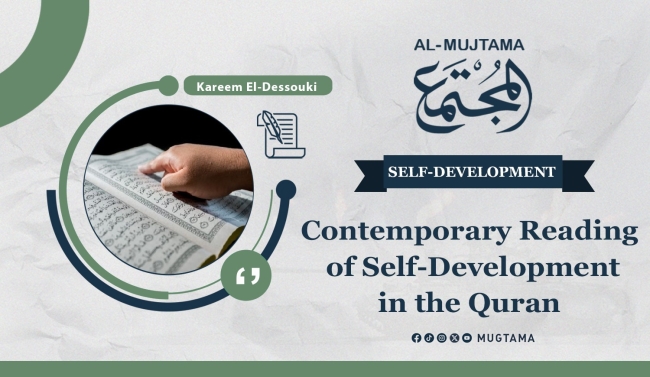Contemporary Reading of Self-Development in the Quran
In an era where knowledge and its production are evolving at a staggering pace, self-development has become a focal point for many, aiming to achieve success and balance in life. While modern theories and methods abound in this field, the Quran offers a comprehensive and integrated vision of self-development. This vision is rooted in firm spiritual and moral foundations but transcends the narrow concept of personal success to link individual growth to one's responsibilities toward Allah and society.
While Western perspectives on self-development often revolve around the "individual" and their personal growth, the Quran presents this concept through an integrated lens, considering humans as inseparable from their communities. This notion is articulated by the late Islamic thinker Dr. Taha Jabir Al-Alwani in his book Human Development in the Quran, where he highlights that self-development in the Quran is based on the concept of stewardship (khilafah) on earth.
Al-Alwani states that Allah created humans, honored them, and made them stewards on earth, which necessitates developing their abilities and capacities to fulfill this great mission. From this perspective, self-development becomes a means to achieve a higher purpose.
Within this framework, the Quran emphasizes the worship of "reflection and contemplation" as foundational principles of self-development. This is evident in numerous verses, such as: "Then do they not reflect upon the Quran, or are there locks upon [their] hearts?" (Muhammad: 24).
The late scholar Dr. Yusuf Al-Qaradawi, in his book The Mind and Knowledge in the Quran, describes this concept as the key to self-development and the enhancement of human intellectual and spiritual capacities. He notes that contemplation on the signs of Allah—both in the universe and in the Quran—opens new horizons for understanding and knowledge, contributing to holistic personality development.
Another crucial principle of self-development from the Quranic perspective is self-accountability and continuous evaluation. This is illustrated in the verse: "O you who have believed, fear Allah. And let every soul look to what it has put forth for tomorrow—and fear Allah. Indeed, Allah is Acquainted with what you do." (Al-Hashr: 18).
In this regard, Dr. Suad Saleh, a professor of comparative jurisprudence at Al-Azhar University, mentions in her book Islamic Education and Its Role in Individual and Society Development that self-accountability is one of the most significant mechanisms of self-development in Islam. It drives individuals toward continuous improvement and rectification of mistakes. She adds that this principle helps in fostering self-awareness and personal responsibility, which are essential elements of effective self-development.
When comparing the Quranic principles of self-development with modern theories in psychology and human development, one finds similarities in certain aspects and differences in others. For instance, the concept of self-awareness in Daniel Goleman's emotional intelligence theory aligns with the Quranic principle of self-accountability.
Goleman states in his book Emotional Intelligence that self-awareness is the cornerstone of emotional intelligence. This concept aligns with the Quranic notion of self-accountability but is distinguished by linking self-development to spiritual and moral dimensions, which may be absent in contemporary Western theories.
Better Outcomes
A study conducted by researcher Muhammad Al-Ghazali, titled The Impact of Applying Quranic Principles of Self-Development on the Mental Health of Muslim Youth, published in the Journal of Psychological and Educational Studies at Al-Azhar University, found that youth who apply Quranic principles of self-development enjoy higher levels of life satisfaction and mental health compared to their peers who do not adopt these principles.
The study involved a sample of 500 young men and women. The results showed that 78% of participants who applied Quranic principles recorded higher levels on measures of mental health and life satisfaction.
To create a practical plan for implementing Quranic self-development principles in a Muslim's life, one can adapt the Seven Habits of Highly Effective People model by Stephen Covey to align with Islamic perspectives.
For instance, the habit of "beginning with the end in mind" can be transformed into the concept of remembering the Hereafter and the purpose of life from the Quranic perspective.
It is worth noting that a 2019 Gallup poll on "Spirituality and Self-Development," which surveyed a sample of 5,000 people worldwide, revealed that 78% of Muslim respondents believe that religious values play a positive role in their self-development, compared to 45% of non-Muslims.
These findings highlight the importance of the spiritual dimension in self-development, particularly for Muslims, and underscore the need for a model of self-development that takes this dimension into account.
In light of the above, it becomes evident that the Quran offers a unique and comprehensive perspective on self-development, combining spiritual, intellectual, and practical dimensions. While some of its principles align with modern theories, it stands out by linking self-development to the ultimate purpose of human existence. Perhaps the greatest challenge for Muslims today is how to activate these principles in their contemporary reality and utilize them to address the challenges of the times while preserving their Islamic identity and values.
Adopting the Quranic approach to self-development does not mean isolating oneself from the world or rejecting everything modern. Rather, it involves benefiting from modern knowledge and techniques within the framework of the Islamic worldview. This is affirmed by the Islamic preacher and thinker Dr. Tareq Al-Suwaidan in his book The Art of Success, where he states that the goal is to combine authenticity and modernity. He emphasizes that this approach enables Muslims to engage positively with contemporary demands without compromising their values and identity.
-------------------------------------------------------------


